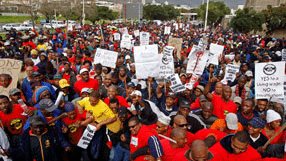
Signs of progress in the showdown between the South African Transport and Allied Workers Union (Satawu) and logistics group Transnet came a day after a court order barred another industrial action by electricity workers.
The transport strike has dented exports of metals, cars, fruit and wine to Europe and Asia, as well as imports of vehicle parts and fuel.
The ruling African National Congress (ANC) has pressed both sides for a quick solution, warning the dispute could destabilise the World Cup, which starts on June 11 and runs for a month.
Satawu said it expected its members to vote on Thursday on the new offer it received from Transnet and expressed confidence they would approve it.
"Satawu national leadership is optimistic that the new offer will be given the green light by the Transnet membership. If the members approve the offer, it is likely that agreement will be signed tomorrow afternoon and workers will return to work on Friday," it said in a statement.
Transnet described the offer, which includes a once-off payment to all bargaining sector employees, as a "breakthrough" which could end the strike.
Satawu, which represents 39 percent of Transnet's 54,000 workers, has called for sympathy stoppages at other transport firms countrywide, including at the national airline and the coal export terminal, which could start next Tuesday if the dispute with Transnet is not resolved.
The best features, fun and footballing quizzes, straight to your inbox every week.
Late on Tuesday, South Africa's biggest union called off a strike at power utility Eskom due to start on Wednesday after the state-owned firm obtained a last-minute court order declaring the planned industrial action illegal.
Eskom said on Wednesday its operations were normal.
AIR FREIGHT
Fruit producers have begun to use expensive air freight to export their produce and car manufactures have opted to fly in some parts to be able to keep production going.
"There is activity at the ports, but they are operating below their full capacity. Automotive plants are all operating again but limping along, a lot of money has been spent on air freighting parts," said David Powels, president of the National Association of Automobile Manufacturers of South Africa.
Shipping companies are asking clients to pay a surcharge to partly recover their losses.
Fred Jacobs, director for corporate relations at Maersk Line, said the firm faced "significant extraordinary costs".
Fuel imports through South Africa to landlocked Botswana have fallen by a half, but supplies within South Africa itself have been unaffected.
Transnet said that with 65 percent of its workers back at work after the company's bigger union accepted a previous wage offer, the logistics group had managed to move a backlog of crucial shipments, including World Cup cargo.
The South African Chamber of Commerce and Industry (SACCI) said the strike could have long-lasting consequences for the country's exports as it may lose its competitive edge.
 Join The Club
Join The Club





